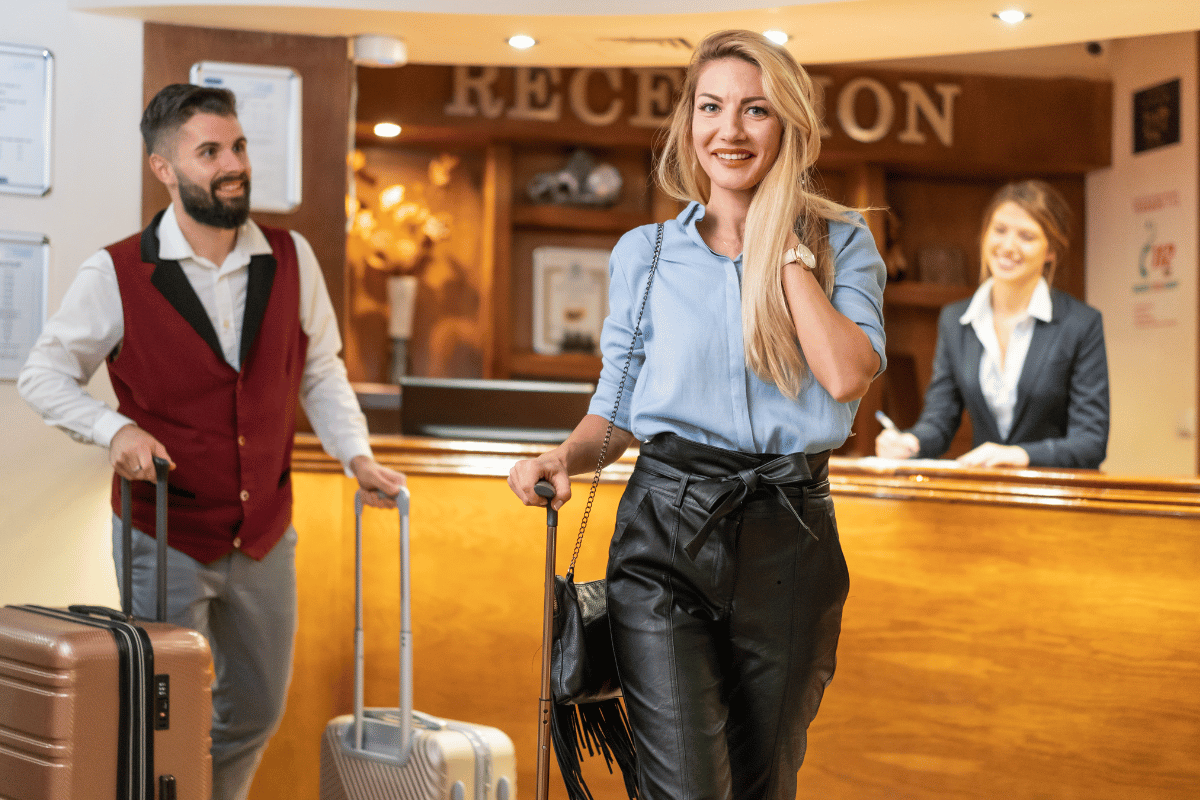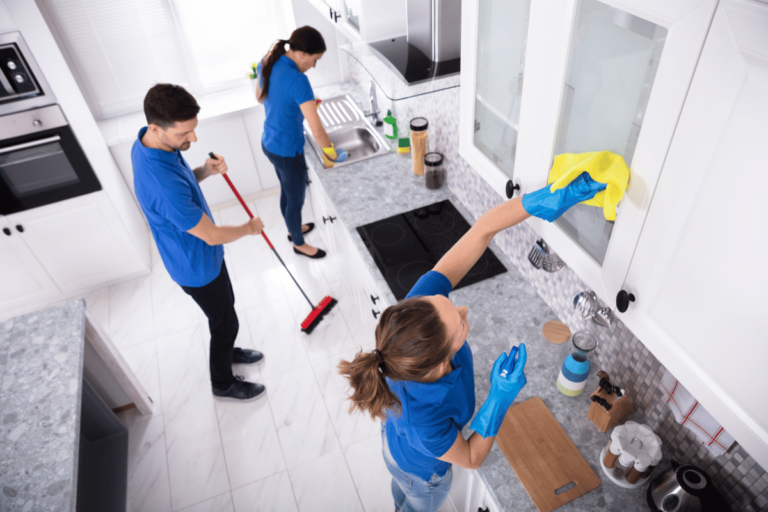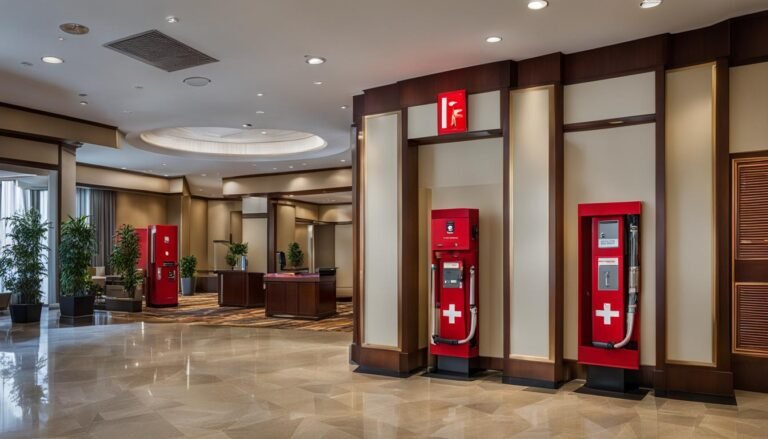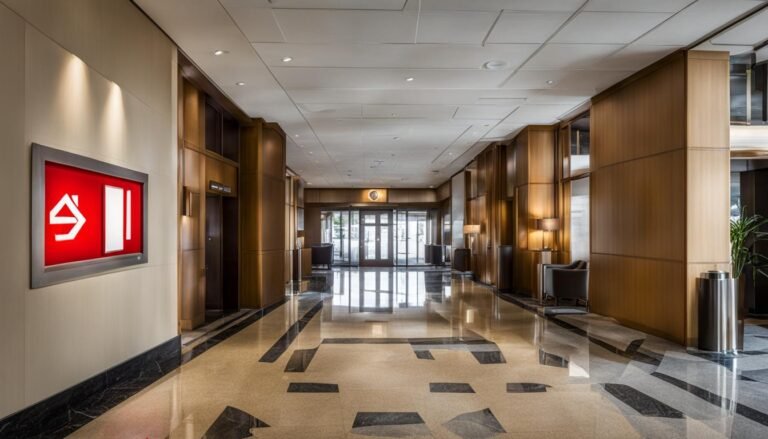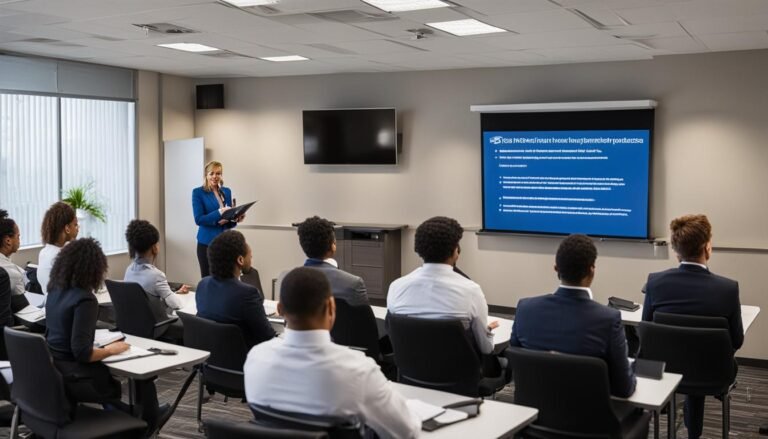Ensuring Guest Safety: Security Measures in Hotels Guide
Welcome to our comprehensive guide on ensuring guest safety and implementing effective security measures in hotels. The safety and security of guests are of utmost importance to hotels, and it is essential to have robust protocols in place to protect their well-being throughout their stay.
In this guide, we will explore the top hotel safety and security issues in 2024, the benefits of using a hotel safety checklist, elements of a good checklist, preventive and operational measures for hotel security, liquidation measures in case of security breaches, specific security strategies for hotels, and the importance of anti-terrorism measures.
By following these security guidelines and implementing a comprehensive security system, hotels can ensure the safety and security of their valued guests, giving them peace of mind throughout their stay.
Key Takeaways:
- Guest safety is a top priority for hotels.
- Using a hotel safety checklist helps track security protocols.
- A good checklist should have clear instructions and be easy to use.
- Preventive measures include educating guests about potential hazards.
- Operational measures involve swift response to security threats.
Top Hotel Safety & Security Issues in 2024
The hotel industry is constantly evolving, and with that comes new safety and security challenges that hotels must address to ensure the well-being of their guests. In 2024, several key safety and security issues will be at the forefront of the hotel industry.
1. Monitoring Entrances and Exits
Monitoring entrances and exits is crucial for controlling access to hotel premises and preventing unauthorized individuals from entering. With the rise of contactless check-in and mobile key technology, hotels must ensure that these systems are secure and properly monitored to prevent any potential breaches.
2. Government Compliance
Government regulations and compliance requirements continue to play a significant role in hotel safety and security. Hotels must stay updated on local, state, and federal laws to ensure they are meeting the necessary standards and protocols, such as fire safety regulations, emergency response plans, and ADA compliance.
3. Health and Safety Protocols
In the wake of the COVID-19 pandemic, health and safety protocols have become a top priority for hotels. Implementing rigorous cleaning and sanitization measures, enforcing social distancing guidelines, and providing personal protective equipment are essential to maintaining a safe and secure environment for both guests and staff.
4. Slip and Fall Prevention
Slip and fall incidents can lead to serious injuries and potential legal liabilities for hotels. Implementing proper lighting, maintaining clear pathways, and regularly inspecting and repairing flooring and other surfaces can help reduce the risk of slip and fall accidents.
5. Electrical and Fire Safety
Electrical and fire safety measures are critical in hotels to protect guests and prevent potential disasters. Regular inspections of electrical systems, adherence to fire safety codes, and the presence of functional smoke detectors and fire extinguishers are essential for maintaining a safe environment.
6. Suspicious Activity
Hotels must be vigilant in identifying and addressing suspicious activity to prevent theft, vandalism, or other criminal incidents. Implementing comprehensive security camera systems, training staff to recognize signs of potential threats, and establishing effective communication channels with local law enforcement are vital for ensuring guest safety.
Hotels must ensure vigilant monitoring systems to effectively detect and prevent potential security threats. Comprehensive software solutions like those offered by Bold Group can greatly support these needs through advanced alarm monitoring technology alongside business management tools, facilitating a unified platform for efficient security operations.
By addressing these top hotel safety and security issues in 2024, hotels can create a secure and welcoming environment for their guests, promoting peace of mind and enhancing overall guest satisfaction.
| Issue | Description |
|---|---|
| Monitoring Entrances and Exits | Controlling access to hotel premises and preventing unauthorized entry |
| Government Compliance | Staying updated on regulations and meeting safety standards |
| Health and Safety Protocols | Implementing cleaning, distancing, and PPE measures |
| Slip and Fall Prevention | Reducing the risk of accidents through proper maintenance |
| Electrical and Fire Safety | Maintaining functional systems and adhering to safety codes |
| Suspicious Activity | Identifying and addressing potential threats to guest safety |
How a Hotel Safety & Security Checklist Can Help
A hotel safety checklist is a vital tool in ensuring the safety and security of guests. By implementing comprehensive security protocols and conducting regular safety checks, hotels can create a secure environment for their guests. This article will highlight the importance of a hotel safety checklist and how it can improve safety measures within the hospitality industry.
A hotel safety checklist serves as a guide for maintenance teams, security guards, and housekeeping staff to ensure that all necessary security measures are in place. It provides clear instructions on how to handle different security situations and helps staff members stay organized and accountable. From checking surveillance cameras to inspecting fire extinguishers, the checklist covers a wide range of security protocols that need to be regularly monitored.
Not only does a hotel safety checklist facilitate the implementation of security measures, but it also enhances the efficiency of daily operations. By following a standardized checklist, staff members can identify potential risks and take immediate action to address them. This proactive approach helps prevent security breaches and minimizes the impact of any unfortunate incidents. Additionally, a well-maintained checklist can serve as documented evidence of a hotel’s commitment to guest safety.
In conclusion, a hotel safety checklist is a valuable tool that aids in the implementation of security protocols and ensures the safety of guests. By following a set of clear instructions and conducting regular safety checks, hotels can create a secure environment for their guests, enhancing their overall experience. Implementing a comprehensive checklist system is an essential step in prioritizing guest safety within the hospitality industry.
Table: Elements of a Hotel Safety & Security Checklist
| Category | Checklist Items |
|---|---|
| Surveillance | Check camera functionality, monitor blind spots |
| Fire Safety | Inspect fire alarms, test smoke detectors |
| Emergency Preparedness | Review evacuation plans, ensure emergency exits are clear |
| Access Control | Check key card system, verify guest identification |
| Public Areas | Inspect lighting, identify potential slip and fall hazards |
| Guest Rooms | Check locks, test safety features (e.g. smoke detectors) |
| Staff Training | Evaluate security training programs, conduct refresher courses |
Elements of a Good Checklist
A well-designed checklist is a crucial tool for ensuring guest safety and security in hotels. A good checklist should have a clear structure and provide hotel teams with concise instructions on how to carry out necessary tasks. Here are some key elements that make a checklist effective:
- Clear instructions: The checklist should include clear and specific instructions for each task, leaving no room for ambiguity. This ensures that hotel team members understand what needs to be done and how to do it correctly.
- Completeness: The checklist should cover all essential safety and security measures that need to be addressed. It should encompass various areas such as emergency procedures, equipment checks, and routine inspections.
- Logical flow: The checklist should be organized in a logical order, guiding hotel team members through the necessary steps. This helps to streamline processes and minimize the risk of overlooking important tasks.
- Accessibility: A good checklist should be easily accessible to hotel staff, whether it is in a digital format or printed and readily available in designated areas. This ensures that team members can refer to the checklist whenever needed.
Employing a digital software solution like Xenia can greatly enhance the effectiveness of a hotel safety checklist. With Xenia, checklists can be easily created, customized, and shared across teams. The software allows for real-time updates and notifications, ensuring that everyone is on the same page when it comes to safety and security measures.
By implementing a good checklist combined with a reliable software solution, hotels can improve accountability, streamline processes, and ultimately enhance guest safety and security.
Preventive Measures for Hotel Security
Ensuring the safety and security of guests is a top priority for hotels. In addition to implementing operational and liquidation measures, preventive measures play a crucial role in safeguarding hotel security. These measures focus on educating guests about potential hazards and providing them with instructions on how to react in emergency situations.
Guest Education: One of the key preventive measures for hotel security is educating guests about potential risks and how to stay safe during their stay. Hotels can provide informational brochures or digital materials in guest rooms that highlight emergency protocols, evacuation routes, and important contact information. By arming guests with this knowledge, they are better prepared to navigate unexpected situations.
“Guest safety is our top priority. We believe that educating guests about potential hazards and providing them with clear instructions is essential in ensuring their well-being during their stay.” – Hotel Manager
Emergency Preparedness Training: Hotel staff should receive comprehensive training on emergency preparedness to effectively handle various scenarios. This includes training on how to respond to fire emergencies, medical situations, and other security threats. By equipping staff with the necessary skills and knowledge, hotels can minimize risks and ensure a prompt and efficient response in times of crisis.
Overall, preventive measures in hotel security aim to minimize potential risks and empower both guests and staff with the tools and knowledge needed to navigate emergency situations. By prioritizing guest education and investing in emergency preparedness training, hotels can create a safe and secure environment for all.
| Preventive Measures for Hotel Security | Description |
|---|---|
| Guest Education | Educate guests about potential hazards, emergency protocols, and important contact information. |
| Emergency Preparedness Training | Provide comprehensive training to hotel staff to effectively respond to various emergency situations. |
Operational Measures for Hotel Security
When it comes to ensuring the safety and security of guests, operational measures play a crucial role. Hotels must have effective protocols in place to respond swiftly to security threats, conduct thorough investigations, and maintain vigilant monitoring systems.
Immediate response is a key component of operational measures for hotel security. This includes having a well-trained security team that can promptly address any security concerns or incidents that may arise. By having trained personnel on-site, hotels can ensure that security issues are dealt with in a timely and efficient manner.
In addition to immediate response, conducting thorough investigations is essential for effective hotel security. When incidents occur, it is important for hotels to thoroughly investigate the situation to identify the root cause and take appropriate action. This may involve reviewing surveillance footage, interviewing witnesses, and collaborating with local law enforcement authorities.
“Thorough investigations are crucial in maintaining the safety and security of our guests. By meticulously examining each incident, we can gather valuable insights and make informed decisions to enhance our security measures.”
Effective monitoring systems are also an integral part of operational measures for hotel security. Hotels should have surveillance cameras strategically placed throughout the property to monitor entrances, common areas, and potentially vulnerable locations. These cameras should be regularly checked and maintained to ensure their functionality and effectiveness in deterring and detecting security threats.
By implementing strong operational measures, hotels can effectively mitigate security risks and provide a safe environment for their guests. Immediate response, thorough investigations, and vigilant monitoring systems are essential components of a comprehensive security strategy.
Hotel Security Operational Measures Overview
| Operational Measure | Description |
|---|---|
| Immediate Response | Promptly addressing security concerns or incidents with a well-trained security team. |
| Thorough Investigations | Conducting detailed investigations to identify root causes and take appropriate action. |
| Effective Monitoring Systems | Utilizing strategically placed surveillance cameras to monitor and detect security threats. |
Liquidation Measures for Hotel Security
When a security breach occurs at a hotel, it is important to take appropriate liquidation measures to address the situation and ensure guest satisfaction. These measures may include compensation for damages and legal action if necessary. By swiftly responding to security breaches and implementing effective liquidation measures, hotels can uphold their commitment to guest safety and security.
One of the primary liquidation measures is compensating guests for any damages or losses they may have incurred as a result of the security breach. This can include reimbursement for stolen items, medical expenses, or other related costs. By providing compensation, hotels not only demonstrate their accountability but also seek to mitigate the negative impact on the affected guests.
In some cases, hotels may need to take legal action to address the security breach and prevent similar incidents from occurring in the future. This can involve working with law enforcement agencies, filing reports, and pursuing legal remedies against the responsible parties. Taking legal action can help ensure that there are consequences for those who compromise guest safety and deter others from engaging in similar activities.
Table: Example of Liquidation Measures
| Liquidation Measures | Description |
|---|---|
| Compensation | Financial reimbursement for damages or losses incurred by guests. |
| Legal Action | Pursuing legal remedies against responsible parties to ensure accountability. |
| Improved Security Measures | Implementing enhanced security protocols to prevent future breaches. |
In addition to compensation and legal action, hotels must also address the underlying security issues that led to the breach. This may involve implementing improved security measures such as enhanced surveillance systems, access control protocols, and training programs for staff members. By taking these proactive steps, hotels can minimize the risk of future security incidents and provide a safer environment for their guests.
Overall, liquidation measures play a crucial role in maintaining guest trust and ensuring their safety in hotels. By promptly and effectively addressing security breaches, providing compensation, and taking legal action when necessary, hotels can demonstrate their commitment to guest satisfaction and security.
Specific Security Strategies for Hotels
Ensuring the safety and security of hotel guests requires the implementation of specific security strategies tailored to address potential risks and vulnerabilities. By adopting proactive measures and utilizing technology, hotels can provide a safe environment for their guests and enhance their overall experience.
Screening of Calls
One key security strategy is the screening of calls to mitigate risks associated with unwanted solicitation or potential threats. Hotel staff should be trained to handle incoming calls and verify the identity and intentions of the caller before sharing any personal or confidential information. Implementing a system that filters and records calls can assist in monitoring and investigating any suspicious or harassing calls.
Enhanced Security for Single Lady Travelers
Recognizing the unique security concerns faced by single lady travelers, hotels can enhance their safety by implementing specialized measures. This may include assigning rooms on higher floors, near elevators, or with additional security features like double locks. Providing clear information about hotel facilities, nearby attractions, and transportation options can also empower single lady travelers to make informed decisions and navigate their surroundings with confidence.
Skipper Protocols and Guest Blacklists
Hotels can implement skipper protocols, requiring guests to provide identification or verify their reservation details upon check-in. This helps to prevent unauthorized individuals from accessing guest floors and facilities. Additionally, maintaining a guest blacklist, which includes individuals with a history of disruptive behavior or security breaches, can serve as a reference to identify and mitigate potential risks.
| Specific Security Strategies | Benefits |
|---|---|
| Screening of Calls | – Mitigates risks of unwanted solicitation – Enhances guest privacy and safety – Enables monitoring and investigation of suspicious calls |
| Enhanced Security for Single Lady Travelers | – Provides a safe environment for female guests – Empowers guests to make informed decisions – Addresses unique security concerns |
| Skipper Protocols and Guest Blacklists | – Prevents unauthorized access to guest floors – Identifies and mitigates potential risks – Enhances overall security measures |
Implementing specific security strategies such as screening calls, providing enhanced security for single lady travelers, and implementing skipper protocols can significantly contribute to the overall safety and security of hotels. By prioritizing guest safety through these proactive measures, hotels can foster a secure and comfortable environment for all their guests.
Anti-Terrorism Hotel Safety and Security
Ensuring the safety and security of guests is of utmost importance in the hotel industry. In today’s world, it is crucial for hotels to have measures in place to address the threat of terrorism. By implementing robust security protocols, hotels can protect their guests and maintain a safe environment.
Organizational preparedness is a key aspect of anti-terrorism hotel safety and security. Hotels should have comprehensive emergency response plans in place, outlining procedures for different scenarios. These plans should be regularly reviewed and updated to ensure they align with evolving threats. Additionally, staff should receive regular training and drills to familiarize themselves with emergency procedures and enhance their ability to handle potential threats.
Technology utilization plays a crucial role in enhancing hotel security. Hotels should invest in advanced surveillance systems that cover all areas of the property, including entrances, lobbies, and parking lots. Real-time monitoring is essential to detect and respond to suspicious activities promptly. Additionally, access control systems can restrict unauthorized entry to certain areas, ensuring guest safety and preventing unauthorized access to sensitive areas of the hotel.
Effective communication is paramount in emergency situations. Hotels should establish clear and efficient communication channels among staff members and with local law enforcement agencies. This enables quick dissemination of information and coordination during crisis situations. Guest communication is also important, and hotels should have systems in place to alert and update guests in the event of an emergency.
Remember, anti-terrorism measures are just one component of a comprehensive hotel safety and security strategy. By implementing a multi-layered approach that includes preventive measures, operational measures, and liquidation measures, hotels can create a secure environment for their guests. In an increasingly uncertain world, prioritizing the safety and security of guests is not only a legal requirement but also a moral obligation.
Conclusion
Ensuring guest safety and implementing effective security measures are crucial for hotels in today’s world. By prioritizing the safety of their guests, hotels can create a secure and welcoming environment for everyone.
With the use of compliance checklists, hotels can maintain a high level of safety across their properties. These checklists serve as a valuable tool for monitoring security protocols and ensuring that all necessary precautions are taken. From monitoring entrances and exits to complying with government regulations, hotels should plan for essential security issues to guarantee the safety of their guests.
Preventive and operational measures play a significant role in hotel security. Educating guests about potential hazards and providing clear instructions on how to react is a vital preventive measure. Meanwhile, swift responses to security threats, thorough investigations, and effective monitoring systems are essential for operational measures in ensuring guest safety.
Furthermore, hotels must be prepared for potential security breaches. Implementing specific security strategies, such as screening calls and providing enhanced security for solo female travelers, can greatly enhance guest safety. In the event of security breaches, hotels should be ready to take liquidation measures, including compensating guests for damages and, if necessary, taking legal action to address the situation.
Ultimately, prioritizing safety in the hospitality industry is of utmost importance for hotels. By implementing a comprehensive security system, hotels can ensure the safety and security of their guests, providing them with peace of mind during their stay. By maintaining a secure environment, hotels can protect both their guests and their property.

